Eurogroup 2.0
Adelina Marini, January 22, 2013
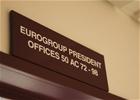 A stage of the Eurogroup evolution (the eurozone finance ministers) has officially ended on January 21st when the first permanent president of the format, Jean-Claude Juncker, was replaced by the young Dutch Minister of Finance Jeroen Dijsselbloem. The selection of the new president was accompanied by rumours, criticism and conflicts between member states which ended, however, with the approval of the only candidate and with marking a new beginning of one of the most significant formats that emerged in the EU in the past years.
A stage of the Eurogroup evolution (the eurozone finance ministers) has officially ended on January 21st when the first permanent president of the format, Jean-Claude Juncker, was replaced by the young Dutch Minister of Finance Jeroen Dijsselbloem. The selection of the new president was accompanied by rumours, criticism and conflicts between member states which ended, however, with the approval of the only candidate and with marking a new beginning of one of the most significant formats that emerged in the EU in the past years.
Eurogroup 1.0
The Eurogroup is created because of France with the aim to ensure policy coordination among the eurozone countries. The European Council endorsed its creation at its summit in December 1997 and the first meeting of the new format took place in June next year. Initially, the presidency of the group followed the same principle as the Council of the EU - rotating. In 2004, the finance ministers decided to select a president and now that is officially included in the Lisbon Treaty. There it is enshrined that the ministers of the single currency member states gather informally to discuss specific responsibilities related to the common currency. It is recommended the meetings to be attended by the European Commission and the central bank. Nothing more specific is mentioned in terms of selection of a president other than fact that the ministers of the member states select a president with a majority for a term of two years and a half.
The first permanent president of the Eurogroup is Jean-Claude Juncker, a Minister 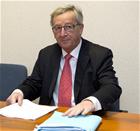 of Treasury (at last night's news conference he specified that there is a difference between a minister of finance and the treasury, but acknowledged that he had no idea what it is) and Prime Minister of Luxembourg. He occupied this position from 1 January 2005 until January 21st 2013. Juncker is described by his colleagues and chiefs of other EU institutions as balancer. He describes himself as a Liberal (he is from the Christian Social People's Party in Luxembourg which is a member of the EPP), and Olli Rehn pointed out that Juncker has always been a pro-active bridge builder.
of Treasury (at last night's news conference he specified that there is a difference between a minister of finance and the treasury, but acknowledged that he had no idea what it is) and Prime Minister of Luxembourg. He occupied this position from 1 January 2005 until January 21st 2013. Juncker is described by his colleagues and chiefs of other EU institutions as balancer. He describes himself as a Liberal (he is from the Christian Social People's Party in Luxembourg which is a member of the EPP), and Olli Rehn pointed out that Juncker has always been a pro-active bridge builder.
During the press conference after the Eurogroup meeting, which ended unusually on time, Jean-Claude Juncker stuck to the principle "work first", taking stock of the main issues the ministers discussed. He left the issue of Dijsselbloem's selection for the end, giving him the floor then and refusing any questions to him before that. After all questions related to the meeting's agenda were over, Mr Juncker took the floor to take a really brief account of his presidency, without elaborating. He underscored that his successor would most certainly have a different style, which looked a relevant remark against the backdrop of the sadness of journalists, analysts and politicians because of the sharpness of wit and humour of the Luxembourg veteran.
 Jean-Claude Juncker said the Dutch finance minister was much younger than him and very new to the work he was to face, which is tough and tense. According to him, however, the Dutchman had all the skills to handle the task. Juncker assured that his successor was a convinced European, which is also an important remark because lately lots of speculation emerged that he, as a Dutch representative, might prove to be a supporter of division. Juncker reiterated his resentment for the artificial division of countries into those with triple A rating and the rest, or along the axis north-south.
Jean-Claude Juncker said the Dutch finance minister was much younger than him and very new to the work he was to face, which is tough and tense. According to him, however, the Dutchman had all the skills to handle the task. Juncker assured that his successor was a convinced European, which is also an important remark because lately lots of speculation emerged that he, as a Dutch representative, might prove to be a supporter of division. Juncker reiterated his resentment for the artificial division of countries into those with triple A rating and the rest, or along the axis north-south.
It's time the Eurogroup to turn the page
It will hardly be an exaggeration to say that with the change of presidency it is possible to strengthen or at least make more visible the changes that happened in the past years in response to the crisis when the Eurogroup evolved into a factor on which the behaviour of financial markets depends. The new chief of the Eurogroup promises not only to keep that but to enhance its influence as in the EU so in the international fora. On the eve of his selection, he sent to his colleagues a letter in which he outlines all his visions and priorities for the development of the Eurogroup and the eurozone crisis as a whole.
The most important is that at this stage it seems he will continue the line of his predecessor. In his letter, Jeroen Dijsselbloem writes that decisive measures have been taken in the past years that lead to restoration of confidence in the euro area. The big challenge, however, would be restoration of sustainable growth and tackling unemployment. Already at hand are elements for stabilisation - the financing of bailouts for troubled countries, the adequate firewalls to prevent a spillover in other countries, the reform of the economic governance and the banking sector. All this goes hand in hand with consolidation efforts and ambitious structural reforms. What is important now, the Dutchman points out, is momentum to continue to ensure that confidence will become sustainable.
taken in the past years that lead to restoration of confidence in the euro area. The big challenge, however, would be restoration of sustainable growth and tackling unemployment. Already at hand are elements for stabilisation - the financing of bailouts for troubled countries, the adequate firewalls to prevent a spillover in other countries, the reform of the economic governance and the banking sector. All this goes hand in hand with consolidation efforts and ambitious structural reforms. What is important now, the Dutchman points out, is momentum to continue to ensure that confidence will become sustainable.
From the challenges Dijsselbloem describes in his letter it becomes clear that for now he will stick to the commitments for completion of reforms. He writes that it is necessary decisions to be implemented and followed up, to stick to promises "we have collectively made". This is a key message and another indicator for consistency. The Premier of Luxembourg so far shared the opinion that all decisions taken in June 2012 for the future of the eurozone should be implemented which is obviously the position of Dijsselbloem as well, although he refrained from entering into details. He only said that the implementation of the tasks on the agenda will not only improve the sustainability of the public finances, but also competitiveness, will tackle imbalances and will boost growth and employment.
As a representative of the Labour Party in The Netherlands, Dijsselbloem believes that a more balanced approach should be undertaken to take into account the social aspect, ensuring a balance between discipline and solidarity. His views about that should echo well in Paris, although French Finance Minister Pierre Moscovici had reservations about his nomination, which he withdrew literally days before the meeting on January 21st.
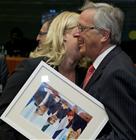 Not one or two journalists were interested whether Dijsselbloem would work for the integrity of the eurozone, which he confirmed and is visible from his letter where he underscores that to achieve the goals concerted efforts will be needed "showing that the euro area is not the cause of the difficult economic times, but part of the solution" - a remark which will be accepted with a smile in Brussels because it is often used by Jose Manuel Barroso. We should work together for the interest of the euro as a whole, the Dutch Finance Minister writes. He will continue his work as a minister of finance in Mark Rutte's government as well.
Not one or two journalists were interested whether Dijsselbloem would work for the integrity of the eurozone, which he confirmed and is visible from his letter where he underscores that to achieve the goals concerted efforts will be needed "showing that the euro area is not the cause of the difficult economic times, but part of the solution" - a remark which will be accepted with a smile in Brussels because it is often used by Jose Manuel Barroso. We should work together for the interest of the euro as a whole, the Dutch Finance Minister writes. He will continue his work as a minister of finance in Mark Rutte's government as well.
His main priorities are: the economic challenges for the eurozone; surveillance procedures; economic governance; enlargement of the euro area and; institutional representation and procedural arrangements. According to him, it is important the eurozone to have a growth strategy of its own that would focus on innovation, support development of new technologies and to re-prioritise public and private spending on R&D. And as the problem with unemployment, especially of young people in the Economic and Monetary Union, is very serious, Dijsselbloem commits himself to enhance dialogue with the social partners whom he believes play an important role.
It is also important to move from crisis handling of problems to a mid-term approach, using the opportunity for deep reforms that would ensure strong growth, sustainable public finances and jobs. He very purposefully focused on the Excessive Deficit Procedure (EDP) which he deems a core of all surveillance procedures. In that context he committed to discuss more prominently the procedure in the Eurogroup and to try and identify a common position of the eurozone for the individual member states. The discussions about deficit should be more closely linked to debates about the 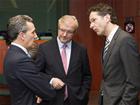 selection of appropriate fiscal and economic policies in the eurozone, Dijsselbloem recommends.
selection of appropriate fiscal and economic policies in the eurozone, Dijsselbloem recommends.
Regarding strengthening the Eurogroup's role at EU level, the Dutch minister of finance points out that, firstly, the Eurogroup should engage actively with the preparation and follow-up of eurozone summits. The decision for such summits was taken at the October European Council in 2011 and that was enshrined in the fiscal compact. Mr Dijsselbloem intends to present the outcome from the preparatory work at the summits. Besides, he intends to pursue a more regular dialogue with the euro area summits president, the Commission chief and also to report regularly to the European Parliament. Dijsselbloem envisages also regular contacts with the Council Presidency to ensure that the Eurogroup business moves smoothly.
Permanent dialogue with the ECB president, with Olli Rehn who has new and stronger powers as a vice president of the Commission responsible for the economic and monetary issues in the euro area as well. The minister plans to update as much as possible the working methods in the Eurogroup which date back to 2008. According to him, given the number of substantial changes that altered the nature and scale of discussions in this format, it is necessary work to be updated. So far the discussions have been circling around the management of the sovereign crisis, while many changes 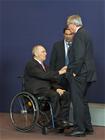 in the economic governance require that to be reflected in the Eurogroup too. In the upcoming months, Dijsselbloem will present proposals in that vein after consultations with all the ministers.
in the economic governance require that to be reflected in the Eurogroup too. In the upcoming months, Dijsselbloem will present proposals in that vein after consultations with all the ministers.
Jeroen Dijsselbloem is born in Eindhoven in 1966. He has a degree in agricultural economics from the Wageningen University and majors in business economics, agricultural policy and social and economic history. He did a masters in business economy in the University of Cork, Ireland. He was an adviser to the minister of agriculture, natural resources and fisheries in 1996, a member of parliament with main activities related to education and youth. He is a minister of finance for only a few months - since November 5th 2012. He speaks impressive English, he is contained and modest. He is yet to face tough challenges, but he seems aware of that, wishing himself to see journalists not more than the usual - once a month - and the meetings not to last until the morning.
More transparency, please!
So far, there are no official reactions from the political groups in the European Parliament. Only the German MEP from the group of Greens and European Free Alliance Sven Giegold, who is a spokesperson of the group on financial matters, reacted sharply criticising the backstage way of selecting Dijsselbloem. Before the beginning of the Eurogroup meeting, the MEP commented that the ministers of finance would just affirm a fait compli. "Quite apart from the question-marks about his limited experience, after only 3 months as finance minister, the deal means yet another opportunity lost in terms of redressing the absence of female representation at the highest level of decision-making in the Eurozone". The European Parliament and Sven Giegold in particular strongly defend more women to occupy high decision-making positions in the EU and almost declared war around the selection of Yves Mersch for member of the ECB board.
The MEP criticised also the lack of a transparent process of selection of the  president, as well as the lack of other candidates. The issue of transparency is especially hot lately because of the numerous and deep changes in the economic governance of the EU and the euro area in particular, which will more and more raise the issue about accountability. Alas, this is set in the Lisbon Treaty itself, where the Eurogroup meetings are defined as informal. Given its growing role, however, this needs to change. Dijsselbloem was not selected unanimously for the position. Jean-Claude Juncker acknowledged that Spain was against. Dijsselbloem himself said he spoke to his Spanish counterpart but was not given any details about his motives. What he received, though, are assurances that Spain will work with the new Eurogroup president.
president, as well as the lack of other candidates. The issue of transparency is especially hot lately because of the numerous and deep changes in the economic governance of the EU and the euro area in particular, which will more and more raise the issue about accountability. Alas, this is set in the Lisbon Treaty itself, where the Eurogroup meetings are defined as informal. Given its growing role, however, this needs to change. Dijsselbloem was not selected unanimously for the position. Jean-Claude Juncker acknowledged that Spain was against. Dijsselbloem himself said he spoke to his Spanish counterpart but was not given any details about his motives. What he received, though, are assurances that Spain will work with the new Eurogroup president.
 Federica Mogherini | © Council of the EU
Federica Mogherini | © Council of the EU | © Council of the EU
| © Council of the EU Luis De Guindos | © Council of the EU
Luis De Guindos | © Council of the EU Klaus Regling | © Council of the EU
Klaus Regling | © Council of the EU Mario Centeno | © Council of the EU
Mario Centeno | © Council of the EU Mario Centeno | © Council of the EU
Mario Centeno | © Council of the EU